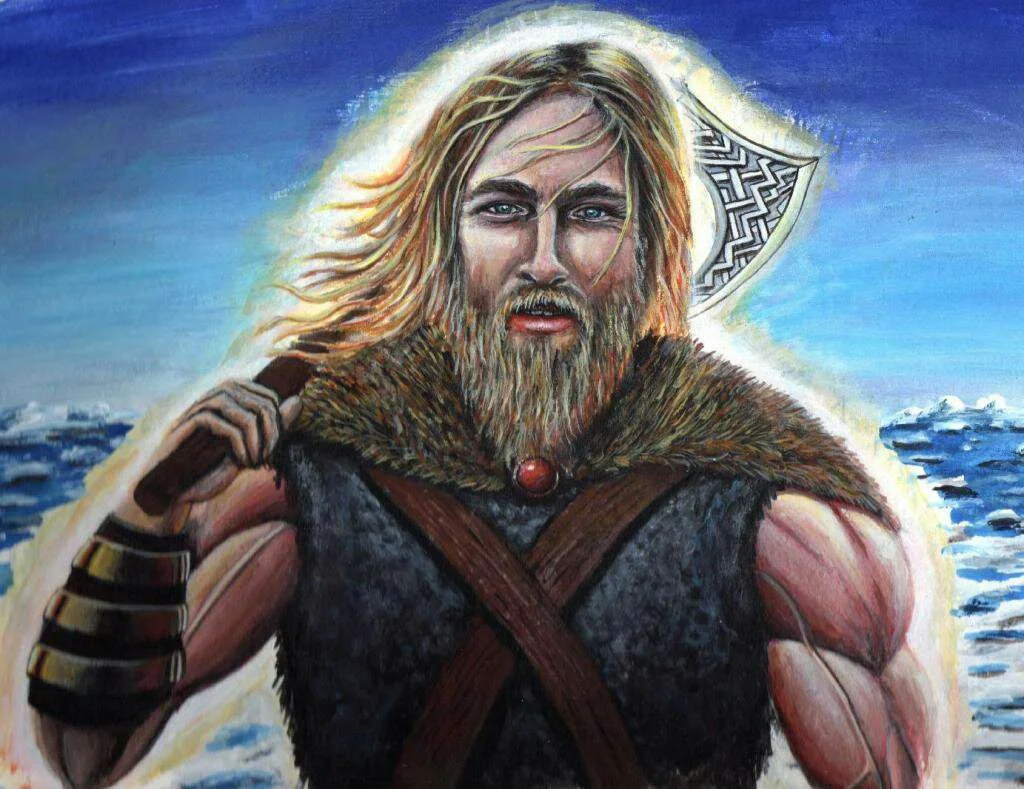
Baldr
In the Scandinavian pantheon, there is a clash with the god Ase (called Balder). Son of Odin and Frigg , friendly, clean, fair, he amazes with his gentleness, wisdom , compassion and willingness to help, all qualities that do not quite correspond to what we may know about the ancient Nordic ethics, at least at the time when it is revealed by the texts, that is, in the Viking Age. Balder is handsome and good-looking. The son he gave birth to from his wife Nanna will one day become the god of justice: Forseti (Frisian, fosit). In Asgardhra, the vast castle where the gods dwell, he lives in Breidhublik (Great Shining). When the world collapses, on the day of the Destiny of the Forces (Ragnarok), he will rise again and lead the general revival.
While everything suggests that this is a solar deity, the sun enjoys a notorious cult in the North, at least in the Scandinavian Bronze Age (~ 1500- ~ 400), not only because it is called "the whitest of the Aesir." “, But because many of the traits or myths attributed to him resemble Baal , Tammuz, Adonis (whose name means "lord", like the word baldr ). His passive nature is also striking: very few memorable actions or high-profile activities are attributed to him.
However, a number of myths directly related to him are puzzling commentators, first of all, about his death. Thanks to the spells of his mother, Frigga, he became invulnerable, and the gods amuse themselves by throwing all kinds of weapons and projectiles at him to test this immunity. But Loki , the god of evil in disguise, bypassed the most humble of plants - mistletoe ( mistilsteinn), which therefore did not match Frigg's request. Loki arms the hand of Balder's blind brother, Hödr, whose name means "fight," with a mistletoe arrow and directs his shot: Balder falls, impaled. Fright is universal. Odin's other son, Hermodhr, travels to the Underworld, who discovers that Balder is indeed under the control of the hideous Hel, the goddess of the realm of the dead. In the end, she gives in: she will return Balder to the world of the gods if all living beings mourn his disappearance. So, Frigga appears at the party, who asks everyone living, people, animals and plants, to mourn Balder. And everyone agrees, except for the disgusting old woman Tyokk, who is none other than Loki, a transvestite again. Thus, Balder will remain in the kingdom of Hel. The gods have him
It is clear to everyone that we are dealing with a very impure complex. On the one hand, Christian influences are clearly visible in this story. The good god, sacrificed by pure wickedness, a direct sacrifice of the spirit of evil, but dedicated to managing a transformed rebirth, is also Christ, the "White Christ," as the pagan Nordics used to say. The Middle Ages are full of Christian legends that make up so many striking parallels with the myths of Balder, such as the story of the blind Longinus piercing Christ with his spear, or the story of Judas dissuading the essence of the tree from abandoning it. cross Of jesus... Magnus Olsen argued that the cult of Balder is the cult of Christ brought to the North in pagan form around 700; this explanation cannot be ruled out. Finnish paganism also knew such similarities in connection with Lemmikainen's final fate in Kalevale .
On the other hand, place names inspired by Baldrs relate primarily to the cult of natural forces: Mount Baldr (Baldersberg), Hill Baldr (Baldrshol), Cape Baldrsness, etc. In this regard, it should be recalled that the plant is known in the North known for its exceptional whiteness, baldrsbrar (literally: "Balder's eyebrow"); this led Fraser to make Balder the god of vegetation, thereby falling under the influence of fertility-fertility. In the same vein, it was still argued that Balder would be an oak tree (indeed, the Germans worshiped trees, and the Celts, whose mythology influenced Norse mythology in more than one respect, revered the oak tree), which lives in symbiosis with the mistletoe, but dies if the parasite cut.
However, as in Eddah so and in the case of burns, Balder is often portrayed as a warrior god, which contradicts all of the above, and the Saxon Grammaticus seems to support this view.
The solution would not mean - "Lord" - the very name of Balder (as, indeed, for Freyr)., a name that has the same meaning)? Thus, due to the vicissitudes of history that were frequent and important in the North, we could have a name that was consistently applied to various deities in accordance with the nature and tropism of the dominant classes. North: originally, in prehistoric times, farmers would have assigned this title to the deity of fertility-fertility; with the waves of Indo-European invaders, a new "Overlord" would be superimposed, which would follow the evolution of the peoples thus established in the North, and would eventually take on a more warlike aspect. The Sun will remain an integral background, undoubtedly the father of all fertility, but from which all heroes and warrior gods inevitably originate.
Leave a Reply